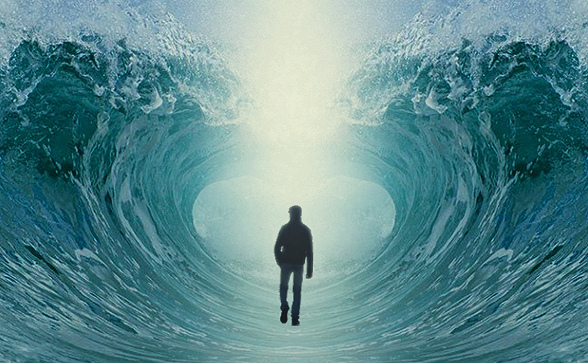Strolling Around the Mall

In last week’s article, The Danger of Breathing in Poisoned Air, we learned that the transgression that led to the Jewish men leaving their holy encampment and going to the Midianite market was because they were not breathing in the pure air that emanated from the mouth of Moshe Rabbeinu. In this week’s essay, we will explore this issue further.
Let’s start off with a simple question. Why were the men strolling through the Midianite market in the first place? In giving his advice, Bilaam said the following (Sanhedrin 106a): אלהיהם של אלו שונא זימה הוא והם מתאוים לכלי פשתן (The G d of these [i.e. the Jews] hates lewdness and they [i.e. the Jews] desire linen garments). Bilaam’s strategy was dependent on two connected factors, one related to what Hashem disliked and the other related to what the people liked. If the people wouldn’t have had a desire for linen garments, nothing would have come of his plan. Think about that.
From where did their desire come? After all, it is written (Devarim 29:4): וָאוֹלֵךְ אֶתְכֶם אַרְבָּעִים שָׁנָה בַּמִּדְבָּר לֹא־בָלוּ שַׂלְמֹתֵיכֶם מֵעֲלֵיכֶם וְנַעַלְךָ לֹא־בָלְתָה מֵעַל רַגְלֶךָ (And I [Hashem] led you in the desert for forty years, the garments that were upon you didn’t wear out, nor did the shoes that were on your feet). If their clothes had not worn out the entire time they were wandering around the desert, why were they strolling in the market looking for new clothes?
We think the answer to that question is rather obvious. After all, haven’t you ever strolled through a mall, looking around to see what might be of interest to buy? Unless you’re a tremendous tzaddik, the answer is, ‘Of course I have. Hasn’t everyone?’ Apparently, we have the same problem that our ancestors had. They had no need of new clothes, yet they were interested in buying new clothes. Most of us have plenty of clothes and have no real need for new ones, yet we’re still interested in buying new clothes. If you’re willing to help yourself, feel free to substitute the word ‘clothes’ for any other item that you know is relevant to you.
What’s behind these cravings? Deficiencies, lacks, holes. We all have them. They’re built into our souls. How do we know this? Notice the words of the brachah that we recite after eating: בּוֹרֵא נְפָשׁוֹת רַבּוֹת וְחֶסְרוֹנָן (Who creates many souls and their deficiencies). These words are not really referring to the physical deficiencies that we all have in our bodies, i.e. mineral deficiencies, protein deficiencies, etc. The wording of the brachah states specifically that the deficiencies are in our souls, not our bodies.
How does one fill a deficiency in a soul? Before we can answer this question, we need to explore the very nature of a deficiency.
It is written (Tehillim 33:6): בִּדְבַר יְיָ שָׁמַיִם נַעֲשׂוּ וּבְרוּחַ פִּיו כׇּל־צְבָאָם (By the word of Hashem, the heavens were made, and with the spirit/breath [ruach] of His mouth, all their host). Even the renewal of the world takes place through this selfsame ruach (Tehillim 104:30): תְּשַׁלַּח רוּחֲךָ יִבָּרֵאוּן וּתְחַדֵּשׁ פְּנֵי אֲדָמָה (You send out Your ruach, they are created, and You renew the surface of the earth). Therefore, we see that everything came into existence and continues to exist through this ruach, the spirit or breath of G d, that imparts life to everything. This, of course, includes the life-force or vitality of mankind, as it is written (Bereshit 2:7): וַיִּפַּח בְּאַפָּיו נִשְׁמַת חַיִּים (And He breathed into his nostrils the breath of life). Therefore, to the extent that this ruach is in abundance, life is in abundance; and to the extent that it is lacking, life is lacking. These ideas are nicely summarized in Likutei Moharan 8:1: נִמְצָא כִּי עִקַּר חִיּוּת כָּל הַדְּבָרִים הוּא בִּבְחִינַת רוּחַ וּכְשֶׁיֵּשׁ חִסָּרוֹן בְּאֵיזֶה דָּבָר עִקַּר הַחִסָּרוֹן הוּא בִּבְחִינַת הַחִיּוּת שֶׁל אוֹתוֹ הַדָּבָר שֶׁהוּא בְּחִינַת הָרוּחַ־חַיִּים שֶׁל אוֹתוֹ הַדָּבָר לַאֲשֶׁר הָרוּחַ הוּא הַמְקַיֵּם הַדָּבָר (We find that the essence of vitality in everything corresponds to ruach, and when there is a deficiency in anything, the essence of its deficiency corresponds to the vitality of that thing, which corresponds to the spirit of life [ruach chaim] of that thing, since that ruach is that which gives the thing its existence).
Therefore, since we all have deficiencies to one degree or another and the ruach chaim is capable of satisfying those deficiencies, the critical question becomes, Where can we obtain this ruach chaim to satisfy all of our deficiencies? R’ Nachman explains (Likutei Moharan 8:2): דַּע שֶׁעִקַּר הָרוּחַ־חַיִּים מְקַבְּלִין מֵהַצַּדִּיק וְהָרַב שֶׁבַּדּוֹר (You should know that we can obtain the essence of the ruach chaim from the Tzaddik and the Rav [Teacher] of the generation). How come? What does such a person possess that we don’t possess? Continuing on (L.M. 8:2): כִּי עִקַּר רוּחַ־הַחַיִּים הוּא בְּהַתּוֹרָה כְּמוֹ שֶׁכָּתוּב וְרוּחַ אֱלֹקִים מְרַחֶפֶת עַל פְּנֵי הַמָּיִם הוּא הַתּוֹרָה וְהַצַּדִּיקִים דְּבֵקִים בַּתּוֹרָה וְעַל כֵּן עִקַּר הָרוּחַ־חַיִּים הוּא אֶצְלָם (For the essence of the ruach chaim is in the Torah, as it is written [Bereshit 1:2], ‘The ruach of G d hovered over the surface of the water’, which is the Torah [see Baba Kamma 82a], and the Tzaddikim cling to the Torah; therefore, the essence of the ruach chaim is from them). If the Torah is symbolized by the water, then what is symbolized by the ‘ruach of G d’? The Midrash answers (Bereshit Rabbah 2:4): וְרוּחַ אֱלֹקִים מְרַחֶפֶת זֶה רוּחוֹ שֶׁל מֶלֶךְ הַמָּשִׁיחַ (‘And the ruach of G d hovered’, this is the ruach of Mashiach).
We should now be able to visualize the picture being painted in Bereshit of the ruach of Mashiach, whose soul is the greatest among all the Tzaddikim, i.e. ‘the Tzaddik and the Rav of the generation’ to use the wording from Likutei Moharan, hovering above the Torah, in intimate union with the Torah. And it is due to this intimate connection with the Torah, the ultimate source of the ruach chaim, that ‘the Tzaddik and the Rav of the generation’ (as well as all of the Tzaddikim of the generation to one degree or another) is able to drawn down that ruach to each individual to fill his deficiencies.
Is there an example of this concept in the Torah itself? Yes. Knowing that his days were numbered, Moshe Rabbeinu was very concerned that Hashem would appoint an individual capable of shepherding the flock of Yisrael. Hashem told him that Yehoshua was to be that man (Bemidbar 27:18): וַיֹּאמֶר יְיָ אֶל־מֹשֶׁה קַח־לְךָ אֶת־יְהוֹשֻׁעַ בִּן־נוּן אִישׁ אֲשֶׁר־רוּחַ בּוֹ וְסָמַכְתָּ אֶת־יָדְךָ עָלָיו (And Hashem said to Moshe, Take to yourself, Yehoshua bin Nun, a man who has the ruach in him, and lay your hand upon him). What ruach did he have in him? Rashi writes: כַּאֲשֶׁר שָׁאַלְתָּ שֶׁיּוּכַל לַהֲלֹךְ כְּנֶגֶד רוּחוֹ שֶׁל כָּל אֶחָד וְאֶחָד (As you requested, someone who will be able to go opposite the ruach of each individual). What does it mean, ‘to go opposite the ruach of each individual’? It means that Yehoshua had within him a ruach, i.e. the ruach chaim, that enabled him to deal with everyone in a manner uniquely beneficial to each individual.
This was also the role of David ha-Melech, another true shepherd of Yisrael. We read in the Gemara (Berachot 3b): כִּנּוֹר הָיָה תָּלוּי לְמַעְלָה מִמִּטָּתוֹ שֶׁל דָּוִד וְכֵיוָן שֶׁהִגִּיעַ חֲצוֹת לַיְלָה בָּא רוּחַ צְפוֹנִית וְנוֹשֶׁבֶת בּוֹ וּמְנַגֵּן מֵאֵלָיו מִיָּד הָיָה עוֹמֵד וְעוֹסֵק בַּתּוֹרָה עַד שֶׁעָלָה עַמּוּד הַשַּׁחַר (A lyre [kinnor] hung over David’s bed, and when midnight arrived, a northern wind [ruach tzefonit] would come and blow in it, and it would play on its own; immediately, he would arise and engage in Torah until the morning). David ha-Melech’s kinnor had five strings corresponding to the five books of the Torah [as stated in Tikkunei ha-Zohar Tikkun 10, 32a] and the ruach tzefonit that blew in it corresponded to the ‘ruach of G d that hovered over the surface of the water’. Therefore, this is the same idea that we learned from Bereshit 1:2. But why, specifically, the ruach tzefonit? R’ Nachman explains (L.M. 8:2): כִּי רוּחַ צָפוֹן הוּא בְּחִינַת הָרוּחַ הַצָּפוּן בְּלִבּוֹ שֶׁל אָדָם שֶׁהוּא בְּחִינַת הָרוּחַ־חַיִּים (For the ruach tzafon [north wind] corresponds to the ruach tzafun [the hidden spirit] in the heart of man, which corresponds to the ruach chaim. It was, so to speak, David’s job to immerse himself in the Torah every night to such an extent that he literally became one with the Torah, becoming the Tzaddik and Rav of his generation, corresponding to Moshe Rabbeinu in his generation and Yehoshua bin Nun in his generation, אִישׁ אֲשֶׁר־רוּחַ בּוֹ (‘a man who has the ruach in him’), enabling him to satisfy the unique deficiencies of each and every Jew.
We can also learn from what David wrote in Tehillim 37:4 that the deficiencies of a man are in his heart: וְהִתְעַנַּג עַל־יְיָ וְיִתֶּן־לְךָ מִשְׁאֲלֹת לִבֶּךָ (Delight over Hashem and He will give you the requests of your heart). We read a similar sentiment in Tehillim 20:4: יִתֶּן־לְךָ כִלְבָבֶךָ וְכׇל־עֲצָתְךָ יְמַלֵּא (May He give you according to your heart, and all your counsel may He fulfill). What’s the point? We need to pray that our requests of the heart be fulfilled, since that is where the deficiencies reside.
To encapsulate what we have learned—all of us, just like the Jewish men in the wilderness who strolled around the Midianite marketplace, have deficiencies in our hearts. These deficiencies are like holes in our heart, spiritual holes that we can actually sense. Some of us are aware of these holes only subconsciously while others sense them consciously, each to his own level. Further, each of us spends a lifetime trying to fill those holes. This isn’t wrong. It’s what we are supposed to do. However, we have to go about it the right way. We can’t fill spiritual holes with physical desires. It’s not possible. Although we may want to deny this fact from time to time, denial won’t help. It will just postpone the inevitable, a realization that our holes are still unfilled. The truth of the matter is that the only way to fill spiritual holes is through spiritual desires and pursuits, specifically, breathing in the Torah that emanates from the mouth of the Tzaddik of each generation. There is no other way.
But is there really such a person in each generation, even in our lowly generation? Apparently so (Likutei Moharan 282): וְדַע שֶׁיֵּשׁ בְּכָל דּוֹר וָדוֹר רוֹעֶה וְהוּא בְּחִינוֹת מֹשֶׁה שֶׁהוּא רְעָיָא מְהֵימָנָא (And you should know that there is in each generation, a shepherd, and he is corresponds to Moshe, who is the faithful shepherd). Our job is to search for him, and once we have found him, to breathe in the clean, pure air from his mouth, for it is only through his Torah that we can truly fill all of the deficiencies in our heart, all of the spiritual holes in our lives.
So next time you take a stroll through a modern day Midianite marketplace, ask yourself a simple question. What am I really doing here?






